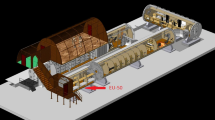Abstract
The results of the study of the innate and adaptive immunity indicators in 12 cosmonauts who took part in long-term (128–215 days) expeditions on board the International Space Station (ISS) are presented. It was shown that the space flight may lead to deviations in the human immune system. A decrease in the functional activity of phagocytes, NK and T-cells, as well as in the ability of immunocompetent cells to synthesize cytokines were observed. Significant individual changes were observed in the immune system’s response to a long-term space flight, which indicated an individual’s predisposition to the development of immune reactivity disorders under varying gravitation conditions.
Similar content being viewed by others
References
Konstantinova, I.V., Sistema immuniteta v ekstremal’nykh usloviyakh. Kosmicheskaya immunologiya (The Immune System under Extreme Conditions: Space Immunology.), Moscow: Nauka, 1988.
Rykova, M.P., Antropova, E.N., and Meshkov, D.O., Results of Immunological Studies of Cosmonauts During Readaptation After SF, in Orbital’naya stantsiya MIR (Mir Space Station), Moscow, 2001, vol. 1, p. 615.
Konstantinova, I.V., Rykova, M.P., Lesnyak, A.T., and Antropova, E.N., Immune Changes during Long-Duration Missions, J. Leukoc. Biol., 1993, vol. 54, p. 189.
Rykova, M., Meshkov, D., Antropova, E., et al., The Effects of Microgravity on the Immune System, in International Scientific Cooperation Onboard Mir (Int. Symposium), Lyon, 2001.
Meehan, R.T., Whitson, P., and Sams, C.F., The Role of Psychoneuroendocrine Factors on Spaceflight-Induced Immunological Alterations, J. Leukoc. Biol., 1993, vol. 54, p. 236.
Stowe, R.P., Sams, C.F., Mehta, S.K., et al., Leukocyte Subsets and Neutrophil Function After Short-Term Spaceflight, J. Leukoc. Biol., 1999, p. 179.
Lebedev, K.A., Ponyakina, I.D., and Kozachenko, N.V., The Concept of the Norm in Estimating the Human Immunological Status, Fiziol. Chel., 1989, vol. 15, no. 6, p. 34.
Lebedev, K.A., Ponyakina, I.D., and Avdeeva, V.S., Systemic Notion on the Quiet and Active States of the Immune System, Usp. Sovrem. Biol., 1991, vol. 111, no. 2, p. 229.
Lebedev, K.A. and Ponyakina, I.D., Immunologiya obrazraspoznayushchikh retseptorov (integral’naya immunologiya) (Immunology of Image-Recognition Receptors: Integrated Immunology), Moscow: Librikom, 2009.
Simbirtsev, A.S., Toll proteins: Specific Receptors of Non-specific Immunity, Immunologiya, 2005, no. 6, p. 386.
Janssens, S. and Beyart, R., Role of Toll-Like Receptors in Pathogen Recognition, Clin. Microbiol. Rev., 2003, vol. 16, p. 1.
Khaitov, R.M. and Leskov, V.P., Immunity and Stress, Ros. Fiziol. Zh. im. I.M. Sechenova, 2001, vol. 87,issue 8, p. 1060.
Koval’chuk, L.V. and Cheredeev, A.N., Current Problems of Immune System Estimation in Humans, Immunologiya, 1990, no. 5, p. 4.
Thornton, A.M. and Shevach, E.M., CD4+ CD25+ Immunoregulatory T-Cells Suppress Polyclonal T-cell Activation in Vitro by Inhibiting Interleukin 2 Production, J. Exp. Med., 1998, vol. 188, p. 287.
Roncarolo, M.G., Bacchetta, R., Bordignon, C., et al., Type 1 Regulatory Cells, Immunol. Rev., 2001, vol. 182, p. 68.
Shevach, E.M., McHugh, R.S., Thornton, A.M., et al., Control of Autoimmunity by Regulatory T-Cells, Adv. Exp. Med. Biol., 2001, vol. 490, p. 21.
Chernykh, E.R., Leplina, O.Yu., Tikhonova, M.A., et al., The T-cell Anergism Phenomenon in Surgical Sepsis, Med. Immunol., 2003, vol. 5, nos. 5–6, p. 529.
Kurganova, E.V., Tikhonova, M.A., Strel’tsova, E.I., et al., Regulatory T-Cells in Immunosupression Patogeny in Sepsis, Med. Immunol., 2006, vol. 8, nos. 2–3, p. 275.
Crucian, B.E., Stowe, R.P., Pierson, D.L., and Sams, C.F., Immune System Dysregulation Following Short-vs. Long-Duration Space Flight, Aviat. Space Environ. Med., 2008, vol. 79, p. 835.
Sepiashvili, R.I., Functional System of Immune Homeostasis, Allergol. Immunopatol., 2003, vol. 4, no. 2, p. 5.
Author information
Authors and Affiliations
Additional information
Original Russian Text © B.V. Morukov, M.P. Rykova, E.N. Antropova, T.A. Berendeeva, S.A. Ponomaryov, I.M. Larina, 2010, published in Fiziologiya Cheloveka, 2010, Vol. 36, No. 3, pp. 19–30.
Rights and permissions
About this article
Cite this article
Morukov, B.V., Rykova, M.P., Antropova, E.N. et al. Parameters of the innate and adaptive immunity in cosmonauts after long-term space flight on board the international space station. Hum Physiol 36, 264–273 (2010). https://doi.org/10.1134/S0362119710030035
Received:
Published:
Issue Date:
DOI: https://doi.org/10.1134/S0362119710030035




